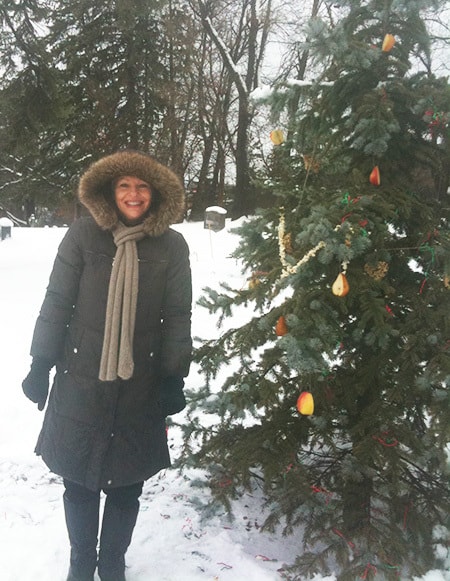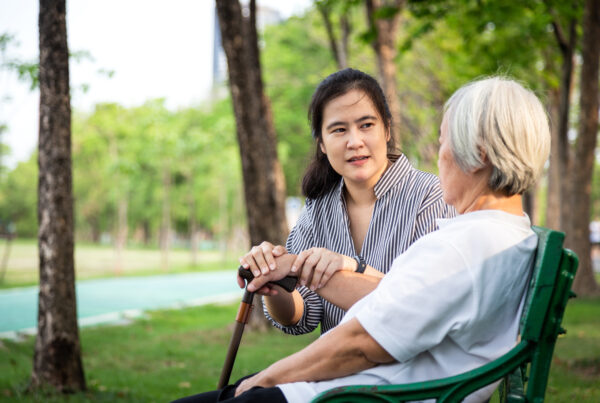Grief During the Holidays – 8 Tips for Surviving
By: Carolyn O’Bryan Cochran, CT, MA, LPC
My daughter and I were out shopping today. It’s early October as I write this, yet we found ourselves surrounded by Thanksgiving, Hanukkah, and Christmas decorations. It took me back to the first holiday season after my own husband Mitch’s death 10 years ago. I was engulfed with grief during the holidays that year. I was sad, angry, lonely—and in no mood for holiday cheer! After doing Thanksgiving as usual that year, I just didn’t have the energy for Christmas. So instead of the usual holiday traditions, my children and I went out to dinner on Christmas Eve, coming home to a Christmas tree-less house. Quite honestly, it was pitiful. Then, inspiration struck. We decided we would decorate the pine tree next to Mitch’s grave with edible ornaments for the birds and squirrels. So, the kids and I strung some cranberries and popcorn, put strings on some halved apples and oranges and headed to the cemetery on Christmas morning. The ritual was so meaningful, we have been decorating that tree every Christmas since. Even my two-year-old granddaughter now helps to decorate “Poppa Mitch’s” grave.
Holidays can be among the hardest times of the year for those who are grieving the loss of a significant loved one. Family gatherings, while sometimes tremendously comforting, can also emphasize the absence of the one who is gone. Holidays are based on long-standing rituals. All of us have those things “we always do” that are part of our family identity. Now, one of the people we shared all the rituals and memories with is gone.
Nothing will take away the hurt and pain we may be feeling. We can’t change what has happened. However, there are some ways to deal with our loved ones’ absences that are more healthy than others, and we’d like to share some practical suggestions to better cope with grief during the holidays.
1. Acknowledge and validate your feelings. Grief is the normal, natural reaction to losing someone we love. Grief during the holidays can involve so many emotions: sadness, anger, relief, loneliness—it can be a real roller coaster. It is important to pay attention to how you’re feeling without judgment. Feelings are neither good nor bad or right or wrong. They simply provide us with information. Pretending dark emotions are not there only gives them more power. Of course grief will color your perception of the holidays. Life has changed. You have changed. It’s okay to be where you are. Set realistic expectations for yourself. Talk about how you’re feeling with someone you trust. I have also found journaling to be tremendously helpful in processing my deepest feelings.
 2. People grieve differently. It is important to understand that everyone grieves in his or her own unique way. This is often challenging for families. Everyone is grieving his or her unique relationship with the loved one who has died. Family dynamics have changed. There may be differing views on how to act during the holidays. Some may want to act as if nothing has happened. For others, the grief is overwhelming. Know this. Expect it. Try to communicate your feelings honestly and respectfully. Don’t expect everyone to be where you are. Be gentle and loving with yourself and each other. Self-compassion, as well as compassion for others, is key.
2. People grieve differently. It is important to understand that everyone grieves in his or her own unique way. This is often challenging for families. Everyone is grieving his or her unique relationship with the loved one who has died. Family dynamics have changed. There may be differing views on how to act during the holidays. Some may want to act as if nothing has happened. For others, the grief is overwhelming. Know this. Expect it. Try to communicate your feelings honestly and respectfully. Don’t expect everyone to be where you are. Be gentle and loving with yourself and each other. Self-compassion, as well as compassion for others, is key.
3. Family Gatherings. Family gatherings can be reminders of our love for one another, AND they can emphasize the absence of the one we love. Plan ahead. Structure your holiday time. Planning helps you feel more secure. This will help you anticipate activities, rather than just reacting to whatever happens. As you make your plans, however, leave room to change them if you feel it is appropriate.
Share the workload among family members. Ask specifically for what you need and it certainly ups the chances you’ll get it. Have the grace to receive from others, as humbling as that is sometimes. Talk to other family members about how to honor your loved one when you’re together. Acknowledge this is a difficult time for you/all.
- Ritual is helpful to acknowledge the loss while enjoying the present. Some suggestions might be:
- Set a place at the table to honor your loved one.
- Light a candle at the beginning of a meal to recognize the sorrow in your hearts and in the room.
- Buy your loved one’s favorite flowers for the table to remind you their love remains with you.
- Prepare traditional foods connected to your loved one.
- Give communal thanks for what remains in the midst of your loss.
- Invite each person to share a funny story or something they are grateful for about your loved one.
- Like our edible ornament Christmas tree, create new rituals that incorporate remembering your loved one.
4. Don’t be afraid to make changes if it feels right. Keep traditions that feed your spirit. Let go of those that don’t. Know you can always change things next year!
Remember the holidays weren’t always perfect before your loved one’s death. Enough said. ☺
5. Spend your energy wisely. There are lots of expectations during the holidays, even when you aren’t grieving. Grief can leave you feeling fatigued. Your low energy level may naturally slow you down. Respect what your body and mind are telling you. It’s okay to cut out things that cause unnecessary stress.
- Plan ahead. Make intentional choices about what you realistically can and cannot do.
- Have a Plan A/Plan B – Plan A is you go to a Christmas party. If it doesn’t feel right, have your plan B ready. Plan B may be giving yourself permission to leave after 30 minutes. Many people find that just having a Plan B in place is enough.
- Shop online if crowds or the holiday atmosphere in stores stresses you.
- It’s okay to say no. You do not have to go to every social event to which you’re invited.
- Remember you are not responsible for keeping the conversation going in social settings.
- Do things that give you energy. Consider doing something for others (volunteering, donating in loved one’s honor, etc.) if that feeds your spirit.
6. Practice good self-care. It is especially important to ground your whole self (body/mind/spirit) during this difficult time.
- Eat healthy foods
- Sleep!
- Exercise/dance
- Spend time in nature
- Talk to trusted friends
- Take “me” time—quiet down time to reflect/remember—but be careful not to isolate!
- Pray, meditate, journal, feed your spirit!
- Look for joy and gratitude
- HALT—Take a step back when you are feeling hungry, angry, lonely and/or tired. Honestly identify needs and don’t feel guilty about fulfilling them.
- Breathe!! Simply taking slow breaths can help kick in the parasympathetic nervous system and relax the body and mind.
7. Prepare for after the holiday. Be aware there may be a low time after the hype of the holidays. You may want to plan something to look forward to once they’re over.
8. Remember: Love does not end with death. Grief is both a necessity and a privilege. It comes as a result of giving and receiving love. Don’t let anyone take your grief away before you are ready. Love yourself. Be patient with yourself. And allow yourself to be surrounded by loving, caring, understanding people.
The beloved Song of Solomon tells us that, “…love is strong as death.” Love always remains. I know this to be true. Remember to hold onto the love, not the grief during the holidays. This will help you honor your loved one as you move forward.
Read about how hospice care can bring comfort to those who are grieving in our article “Comfort Not Fear“.
If you want to watch videos about hospice care, visit our YouTube channel.




